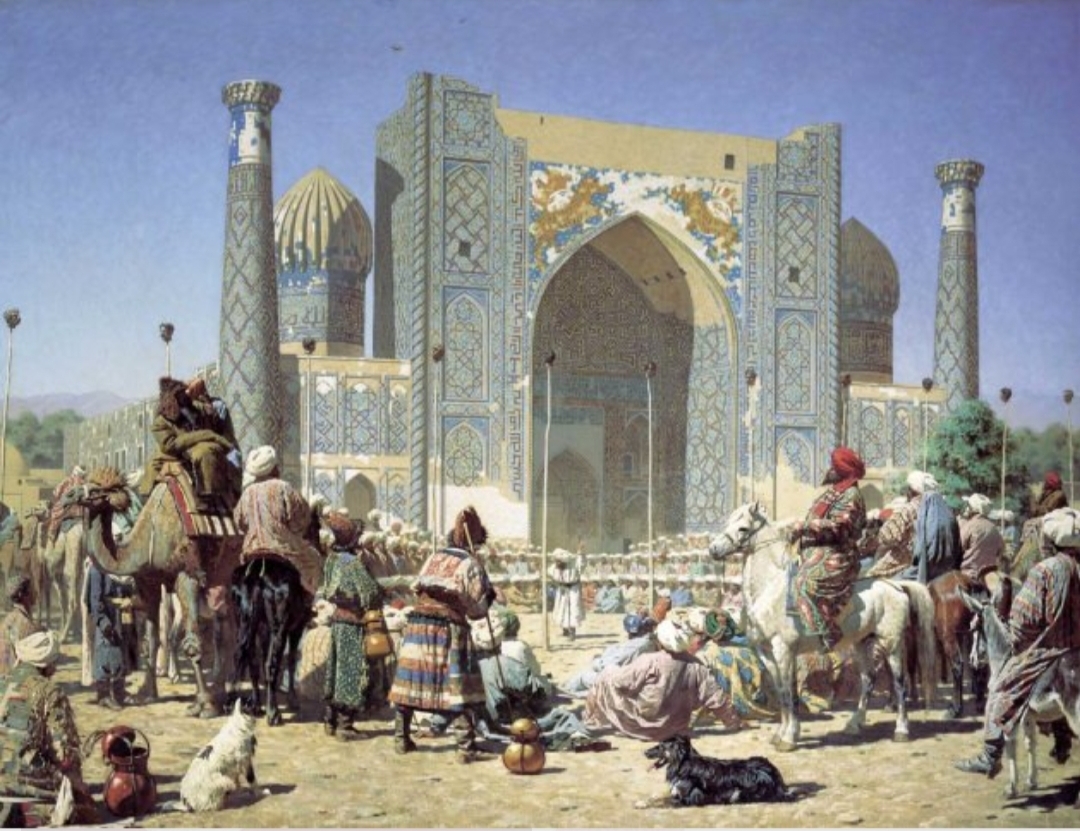
HOW DID TURKS BECOME MUSLIM?
Shortly after the emergence of Islam, in 641, Muslims conquered Syria and Egypt, successfully breaking the wings of the Eastern Roman Empire. The following year, they demolished the Sasanian Empire and reached the banks of the Jeyhun (Oxus) River, establishing their first contact with the Turks.
However, during this period, the assassination of Caliph Umar and his successor Caliph Uthman, followed by internal conflicts in the Islamic Empire, until the early 8th century, did not advance the relationship between Turks and Muslims beyond mere neighboring states.
It is reported that Ubeydullah bin Ziyad, during the reign of Caliph Muawiyah, resettled some of the first Muslims among the Turks in Kufa. This indicates that Islam had already begun to spread among the Turks during this period.
WISE CHOICE
The appointment of al-Hajjaj as the governor of the general province of Iraq, which encompassed all the eastern regions of the Islamic Empire during the Umayyad period, and his appointment of the distinguished commander of that period, Qutayba ibn Muslim, to Khorasan (705), suddenly inflamed the wars. After Muslims quickly gained control of Transoxiana, they launched raids as far as the Talas River.
Under the rule of a Turgesh tribal leader Sulu Qaghan, Turks took control of the battlefields from 720 onwards and defeated Arab armies. However, these struggles paved the way for Turks to become acquainted with and study Islam closely. In the Battle of Talas in 751 between Muslims and Chinese, Turks fought on the side of the Muslims.
This date marks a significant turning point in Turkish history. From then on, Islam, the religion of the new rulers of Turkestan, began to spread primarily among the Gukturks living in the Transoxiana region. Over time, all Turkish lands became acquainted with Islam. Except for a few small groups, Turks fully embraced Islam. The acceptance of Islam by the Turks is a turning point in their history.
What reasons prompted them to embrace this new religion? There are several reasons.
1. Religious reasons: The beliefs and way of life of the Turks were very close to Islam. Basic beliefs such as belief in a single creator, the afterlife, the immortality of the soul, and offering sacrifices to the creator existed in both Turkic and Islamic cultures. Additionally, vices such as adultery, theft, robbery, murder, lying, and deceit were strongly prohibited in both Turkic and Islamic traditions. Polygamy was common among the Turks. Turks did not eat or raise pork. Finally, the command of jihad in Islam was in line with the expansionist views of the Turks.
2. Economic reasons: Upon the conquest of Turkestan by Muslims, extensive trade relations began to be established between the indigenous people of the region and the Muslims. These commercial relations led to close ties between Muslims and Turks and facilitated the Turks' acquaintance with this new religion right at their doorstep. Thus, Islam began to spread initially among the Turks living in cities and engaged in trade. Over time, Turks living in the north and east began to embrace the religion of their compatriots with whom they had commercial relations and shared the same language.
THE INFLUENCE OF GOOD MORALS
3. Social reasons: The adherence of the Muslims of that time to moral principles, their commercial honesty, and the value they placed on justice had a positive influence on the indigenous people with whom they had the opportunity to interact through trade or neighborly relations. Indeed, many nations that later embraced Islam, such as the Malay people, did so en masse after witnessing the good morals of Muslim traders who came to trade with them. These traders, who measured fabric generously when selling (giving more) and conservatively when buying (taking less), mesmerized the people of Asia, prompting them to wonder, "Are these people human or angels?"
4. Political and military reasons: Particularly during the Abbasid period, there was great interest in the Turks. Caliphs formed armies from these new neighbors. They also established garrison cities like Samarra for these armies. The Turks, who had high military capabilities, rose to high positions in the army. Turks were also assigned roles in the administration of the state. Thus, significant military and governmental positions fell into the hands of the Turks. This also led to the warming of Turkish communities to Islam.

CONSENT OF THE HEART
It is evident that Turks became Muslim not by the force of the sword but by the consent of the heart. In Islamic law, it is not permissible to compel people to Islam by force. Indeed, the beginning of the conquest of Turkish lands by Muslims dates back to the early 8th century. The mass conversion of Turks to the Islamic faith occurred almost two centuries later, in the early 10th century.
During this period, there were Turks who converted to Islam, but they did not constitute large numbers. This indicates that Turks embraced Islam not by the force of the sword but by the consent of the heart.
The taxes paid by non-Muslims were actually higher than those paid by Muslims. It was more beneficial for the state for them to remain in their own religion. Therefore, attempting to force non-Muslims to convert to Islam by the sword would not be expected.
Indeed, during the time of the Umayyads, the significant increase in the number of non-Muslims converting to Islam raised concerns among the governors about the decrease in revenue from the jizya (an annual tax levied on non-Muslim citizens) and land tax.
The governor of Egypt at the time wrote a letter to the Caliph Umar ibn Abd al-Aziz in Damascus, informing him that he suspected non-Muslims were converting to Islam to evade the jizya and land tax, and asked whether he should intervene in the situation. The Caliph replied with a historic response, saying, "Allah did not send us as tax collectors. Therefore, there is nothing to be done!"
THE FIRST MUSLIM TURKISH RULERS
Nizak Tarkhan, the ruler of Tocharistan, became Muslim along with his brother in 704 and took the name Abdullah. He participated in expeditions alongside the Muslim commander Qutayba. His son, Salih, served as the governor of Shash (Tashkent) under the Umayyads. Yabgu Bey, the ruler of the Karluk tribe at the time, was also one of the first Muslim rulers. His lineage continued to rule in Tocharistan until the Abbasid period. Tugshad, the ruler of Bukhara, was a prince of the Göktürks. He embraced Islam in 739 and his descendants continued to rule in Bukhara.
Another Göktürk prince, Sul Tekin, the ruler of Jurchen, became Muslim during a visit to Medina. Rulers and poets from his lineage bearing the name Suli emerged. Ihshid Gurek, the ruler of Samarkand, became Muslim upon receiving an invitation letter from Caliph Umar ibn Abd al-Aziz.
His lineage maintained the Samarkand principality. Kavus, the ruler of Ustrushana, embraced Islam in 730. His descendants ruled Ustrushana under the Abbasids. Bazam, the ruler of Merv, is also among the first Muslim Turkish rulers. All of them were vassal rulers under the Göktürks.
THE INCIDENT OF SATUQ BUGRA KHAN
Although Bugra Khan was not the first Muslim Turkish ruler, considering his title as a khan (emperor), he was the first Turkish ruler to convert to Islam at this rank. He became acquainted with Islam through Muslim merchants before the age of 25 while he was the governor of Artush. Their good morals had a profound impact on him.
According to legend, during this time, he saw the Prophet Muhammad (peace be upon him) in a dream, who addressed him, saying, "Has not the time come for you to become Muslim?" Following this, he immediately converted to Islam and took the name Abdulkarim. When Bugra Khan ascended the throne in 924, his conversion to Islam led thousands of Turkish nomads to embrace Islam.
THE EPIC OF ALMISH KHAN
According to legend, about a hundred years before Abdulkarim Satuq Bugra Khan, the first Muslim Turkish ruler, there was Ilteber Almish Khan, ruler of the Volga Bulgars. He converted to Islam and took the name Ja'far, son of Abdullah. This account is reported in the travelogue of the Arab traveler Ibn Fadlan.
The Bulgars, a Turkish tribe who settled near the Volga River and established a state, adopted Islam at an early age. Their ruler, Ilteber Almish Khan, ascended the throne in 920 and took the name Ja'far after converting to Islam. Ja'far was also the name of the Abbasid caliph at that time. However, the Karakhanid ruler Satuq Bugra Khan is the one who gained the most fame as the first Muslim Turkish ruler.
Önceki Yazılar
-
"WOE TO THE ENEMIES OF THE REVOLUTION!" What Was The People’s Reaction To The Kemalist Revolutions?2.07.2025
-
DEATH IS CERTAIN, INHERITANCE IS LAWFUL!25.06.2025
-
THE SECRET OF THE OTTOMAN COAT OF ARMS18.06.2025
-
OMAR KHAYYAM: A POET OF WINE OR THE PRIDE OF SCIENCE?11.06.2025
-
CRYPTO JEWS IN TURKEY4.06.2025
-
A FALSE MESSIAH IN ANATOLIA28.05.2025
-
WAS SHAH ISMAIL A TURK?21.05.2025
-
THE COMMON PASSWORD OF MUSLIMS14.05.2025
-
WERE THE OTTOMANS ILLITERATE?7.05.2025
-
OTTOMAN RULE BENEFITED THE HUNGARIANS30.04.2025